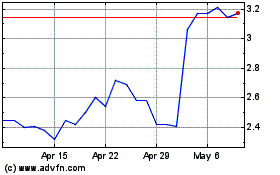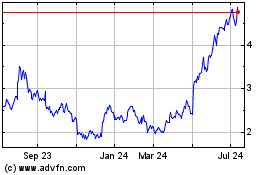Gannett Co. Chief Executive Bob Dickey didn't waste any
time.
On Gannett's first full day as an independent newspaper company
following a spinoff last year, Mr. Dickey called Journal Media
Group Chairman Steven Smith to say he wanted to buy the
company.
Journal Media had completed its own spinoff only three months
earlier and Mr. Smith said such talk might be premature, according
to a regulatory filing detailing the conversation. But Mr. Dickey
wouldn't take no for an answer. Within three months, the deal was
signed for Gannett to acquire Journal Media's 15 daily papers,
including the Milwaukee Journal Sentinel, for $280 million.
Gannett's pursuit of Journal Media proved to be a template for
its next target: Tribune Publishing Co., owner of the Los Angeles
Times and Chicago Tribune. Just days after the Journal Media deal
closed in April, Mr. Dickey approached Tribune with an unsolicited
offer of $12.25 a share, a 63% premium at the time. Tribune, which
had just installed a new management team, rejected the
"opportunistic" offer, but that hasn't stopped Mr. Dickey.
On Monday, Gannett boosted its bid to $15 a share, valuing
Tribune at about $475 million, plus the assumption of debt. Tribune
shares rose 23% to $14.10 in midday trading.
The newfound aggressiveness has become the hallmark for Gannett
after its June split from TV properties. The publisher of USA Today
has been transformed under Mr. Dickey from a corporate giant often
derided for churning out "McPapers" into a rapacious acquirer of
vulnerable rivals.
"Bob has a mandate from his board to make Gannett a major player
in the consolidation of this industry," said a person who was
involved in the Journal Media negotiations. "He had a list of
companies they were interested in right from day one."
Buying print publications might seem counterintuitive for an
industry in steep decline, but Mr. Dickey believes there is value
in building a bigger network of brands that can share more costs
and serve as a more powerful platform for advertisers both in print
and online. Plus, newspaper prices are at record lows.
Mr. Dickey, who started his career at Gannett in ad sales nearly
30 years ago, also has a sense of urgency. Gannett hasn't been
spared in the industry's upheaval as readers and advertising shift
online. The company's ad revenue fell 12% in the first quarter,
dragging down earnings even as Gannett slashed overhead costs.
A soft-spoken and detail-oriented news executive, the
58-year-old Mr. Dickey's emergence as a hard-driving deal-maker has
raised eyebrows among many who know him.
"Bob has a reputation as a conservative and collegial operator,
and many in the industry have been surprised to find Gannett
involved in a takeover" attempt of Tribune, said Jim Friedlich,
head of Empirical Media, a media consultancy group. "That said, the
business logic and benefit of this merger are so strong that they
appear to have overcome any reservations about going hostile."
Pursuing Tribune was something of a course alteration for
Gannett after Mr. Dickey said last year the company would pursue
papers in smaller markets. But while doing due diligence for the
Journal Media deal, Gannett decided to adjust its approach.
"The great thing about strategies is that they can be changed,"
Mr. Dickey said shortly after making the offer to Tribune.
With its 107 small- and mid-market dailies, Gannett already is
by far the largest newspaper publisher by circulation in the
country. Adding Tribune's papers would give it control of nearly
20% of a market in which 41 million papers are sold every day,
according to the Alliance for Audited Media.
Tribune says it is reviewing the sweetened offer. The two sides
exchanged nasty letters after Gannett's initial bid became public
and didn't meet in person until last week. Mr. Dickey and Gannett
Chairman John Jeffry Louis flew to Chicago to sit down with
Tribune's new chairman, Michael W. Ferro Jr., and its new CEO,
Justin Dearborn, at the offices of Tribune's lawyers, Kirkland
& Ellis LLP.
Over the course of the two-hour meeting, Messrs. Ferro and
Dearborn detailed their digital turnaround strategy. Mr. Ferro said
he was willing to consider a merger in which he became the largest
single shareholder, a person familiar with the matter said. In an
email, Mr. Ferro said, "I learned a lot and thought it was pretty
productive for all parties."
Mr. Dickey said his team walked away feeling the meeting was
unproductive. "We did listen to Michael and his strategy and
frankly we did not come away with a lot of confidence that what he
has outlined can be done effectively," Mr. Dickey said in an
interview.
He said that as much as Gannett wants the Tribune deal to go
through, the company is "looking at other opportunities," although
Tribune remains "our primary focus."
Given Tribune's adoption of a so-called poison pill to help fend
off hostile takeovers, the only way Gannett can force the issue is
by waiting until next year to nominate a slate of directors.
Gannett already missed the deadline for this year.
Gannett has been urging Tribune shareholders to withhold their
votes for the board at the annual meeting in June, to pressure
management to enter negotiations.
One major Tribune shareholder, Oaktree Capital Group, has
publicly urged Tribune's board to engage in talks.
Write to Lukas I. Alpert at lukas.alpert@wsj.com
(END) Dow Jones Newswires
May 16, 2016 15:45 ET (19:45 GMT)
Copyright (c) 2016 Dow Jones & Company, Inc.
New Gannett (NYSE:GCI)
Historical Stock Chart
From Mar 2024 to Apr 2024

New Gannett (NYSE:GCI)
Historical Stock Chart
From Apr 2023 to Apr 2024
